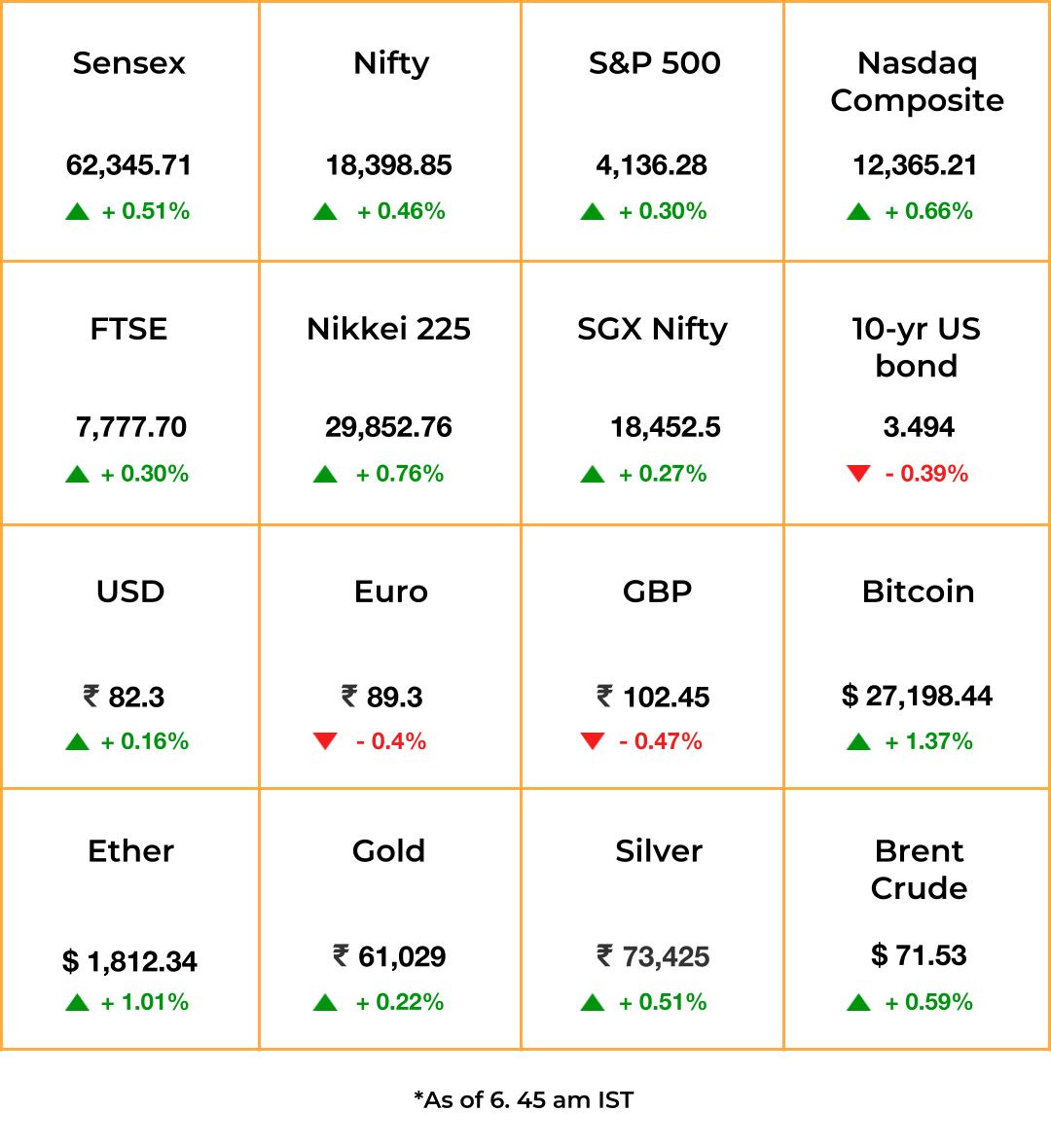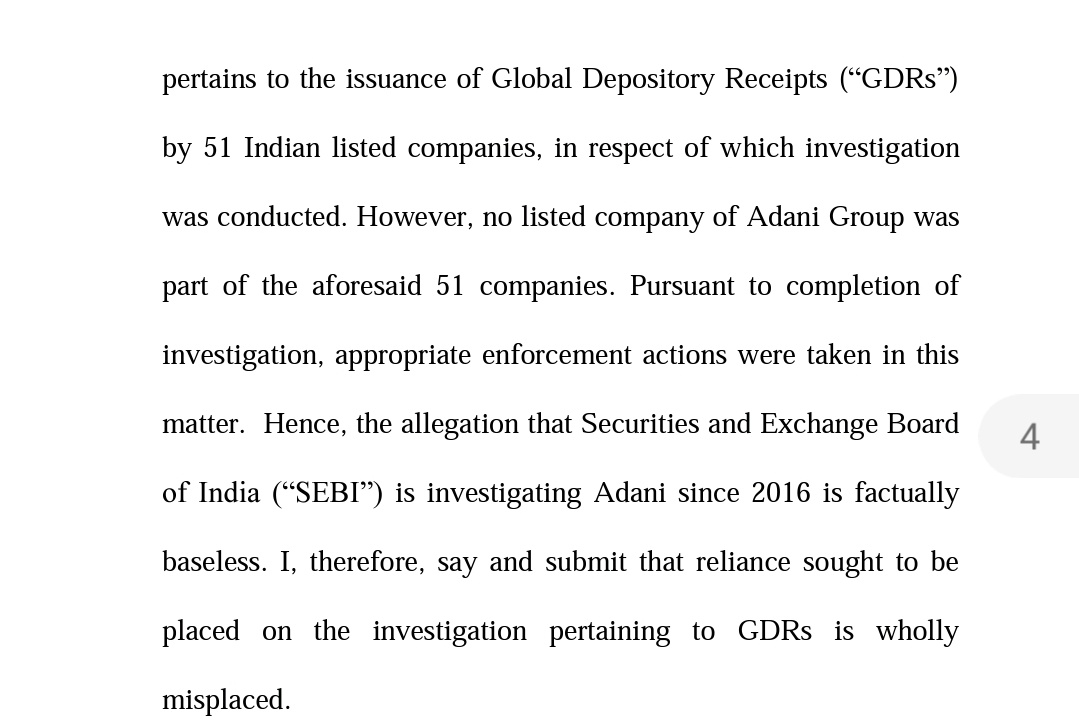Tooth be told
Also in today’s edition: Sebi 👉🏽👈🏽 Finance Ministry; Fact check follies; SoftBank’s behind the curve on this one; Paytm, the debt collector
Good morning! There was a time when WeWork served beer and wine. That ended—globally—in 2020. But come June, offices in Gurgaon will make up for the void and observe happy hours. According to The Economic Times, the Haryana government has given the go-ahead to serve low-content alcoholic beverages such as beer and wine, provided corporate offices employ at least 5,000 workers and have 100,000-square feet offices. Frankly, we see this policy becoming a headache for everyone involved.
Before you move on: If this email has landed on your 'Promotions' tab in Gmail, please move it to the ‘Primary’ tab. Please select "Yes" on the popup that asks you whether to land all emails from The Signal in the inbox always.
🎧 A roll-up candy that’s viral on TikTok led to a smuggling scandal in Israel. Also in today's edition: the funding winter has brought down the valuation of Indian startups. Listen to The Signal Daily on Spotify, Apple Podcasts, Amazon Music, Google Podcasts, or wherever you get your podcasts.
The Signal is now on Telegram! We've launched a group — The Signal Forum — where we share what we’re reading and listening through the day. Join us to be a part of the conversation!
Today’s edition also features pieces by Roshni P. Nair, Julie Koshy Sam, Srijonee Bhattacharjee, and Jaideep Vaidya.
If you enjoy reading us, why not give us a follow at @thesignaldotco on Twitter and Instagram.
The Market Signal*

Stocks & economy: Indian equities may gain as global investors, optimistic about a resolution to the US debt ceiling standoff, were less jittery.
Asian markets, especially Japanese stocks seem to be this week’s pick with foreign investors buying into the economy’s strong fundamentals. Foreign investors had bought ₹1,95,000 crore ($2.38 billion) worth of Indian shares in 12 sessions till Friday.
While western economies are still grappling with high inflation—growth prospects already compromised—the appeal of Asian debt has increased as investors believe the current rate-hiking cycle may have ended. China remains an exception as the central bank will continue to inject liquidity to support an economic recovery. Traders brace for more cues from economic data from China through the week.
Domestic stock indices are expected to scale new highs in the next few sessions. Gains in oil prices may weigh on the Indian currency.
INVESTIGATION
Is Someone Lying Here?

Markets regulator Sebi told the Supreme Court on Monday that the allegation “that it is “investigating Adani since 2016 is factually baseless”.

| |||
#BREAKING SEBI tells #SupremeCourt that it has not probed any #Adani company since 2016 and that it was a wrong statement made last time Says an extension of time is needed to complete the probe in #HindenburgReport case to ensure carriage of justice | |||
 | |||
May 15, 2023 | |||
 | |||
1.02K Likes 434 Retweets 104 Replies |
The statement lit up social media, with Congress leader Jairam Ramesh tweeting that Minister of State for Finance Pankaj Chaudhary had told Parliament in July 2021 that Sebi was investigating some Adani Group companies. Ramesh was clearly hinting that either Sebi or the ministry was lying. The finance ministry quote-tweeted Ramesh saying it stood by its statement to Parliament.

| |||
The Government stands by its reply in Lok Sabha on 19th July 2021 to Q. No. 72, which was based on due diligence and inputs from all concerned agencies. | |||
| |||
May 15, 2023 | |||
 | |||
1.44K Likes 1.35K Retweets 11 Replies |
There are some clever juxtapositions here. Sebi said it had investigated 51 Indian listed companies for violations related to issuance of Global Depository Receipts. There were no listed Adani firms among them. The regulator, however, also said it had approached 11 foreign regulators as early as October 2020 to check if any Adani companies had violated norms related to publicly available shares.
REGULATION
Old Wine, New Bottle
In January, the Ministry of Electronics and Information Technology (MeitY) proposed that the Press Information Bureau (PIB) fact-check online content. Obviously, there was pushback against the country’s nodal media agency—and by extension, the government—becoming the arbiter of truth. The Bombay High Court is hearing a challenge to the Centre’s proposed changes to the draft IT Rules, which includes the formation of this controversial fact-check unit.
The latest development is that the unit will now have three members: two MeitY representatives and one “independent member”. The fact-check team will also verify “only news and fact-based information”, not all content. It’ll also have to justify takedown orders.
So?: In April, MeitY had said that a four-member unit, not PIB, would fact-check online content. It was supposed to have two non-government reps: a media and a legal expert.
The latest update is a dilution of this unit’s independence.
FMCG
‘Naturals’ Is So Last Decade

Image by Adriano Gadini from Pixabay
Colgate India’s MD and CEO Prabha Narasimhan recently told analysts that the market for natural and Ayurvedic toothpaste is declining. The segment had gained popularity in recent years, especially during the pandemic.
Baba effect: ‘Dant Kanti’ toothpaste, made by Ramdev’s Patanjali, became a runaway success in both urban and rural markets in the 2010s. Its success ate into Colgate’s market share between 2015 and 2017, which fell by nearly 4% (pdf). This worried the multinational brand, because customers tend not to change toothpaste frequently.
Dant Kanti’s success prompted Colgate to launch herbal toothpaste, starting in 2016 with Vedshakti. Hindustan Unilever also launched “natural” variants of its personal-care brands, and introduced new ones such as Citra and Lever Ayush. Such was Patanjali’s command over the market that it was the only company to keep toothpaste prices unchanged in 2017, while bigger rivals cut theirs.
The Signal
Colgate’s statement signals a shift not just in the market for ‘herbal’ products but also in Patanjali’s own priorities. Starting 2018, its flagship products began losing steam as its distribution struggled, top line shrank, and new brands began crowding the ‘naturals’ business.
In 2019, Patanjali shifted focus to food, acquiring edible oils firm Ruchi Soya for ₹4,350 crore (~$530 million). Last year, Ruchi Soya acquired Patanjali’s packaged foods business and changed its name to Patanjali Foods Ltd. The gold rush for Ayurveda in personal care is petering out as FMCG companies return to the tried-and-tested way of boosting revenue and profit: selling more premium products.
VENTURE CAPITAL
Late To The Party
When SoftBank founder Masayoshi Son launched the $100 billion Vision Fund in 2017, his objective was to capitalise on what he believed to be truly transformative technology: AI.
Six years later, Vision Funds 1 and 2 are behind the curve. They’ve bled 4.3 trillion yen ($39 billion) for the year ended March 2023 despite entering “defence mode”. Even so, SoftBank reiterated its bullishness on generative AI on its earnings call.
Dilemma: About 10% of Vision Fund portfolio companies have less than a year of runway left, meaning SoftBank can only deploy so much for AI investments. But being defensive means it’ll lose ground to other VCs, who’re racing to capitalise on AI advancements.
SoftBank’s biggest ace is chip-design firm Arm, itself an important player in AI. It owns 75% of the company, which may go public this year. That IPO cash could help SoftBank catch up… eventually.
FINTECH
Collection Muscle

After its stock market humiliation post the overhyped IPO and outrageous valuation, Paytm is exploring all avenues to shore up revenues.
The collector: Persuading partner shadow banks’ delinquent borrowers is paying off somewhat. The fintech company, which earns between 0.5% and 1.5% for collecting overdue loans, boasts of a collection efficiency of 25%-30% for unpaid loans of over 90 days.
The base: Hampered by a central bank ban on taking on new payments bank and gateway users and merchants, Paytm largely relies on the base it built after India’s 2016 demonetisation. In the 12 months to November 2017, its user base shot up from 140 million to 270 million. In the next 65 months, it grew by just 80 million. Paytm has to leverage this base to help originate loans for partners and help them collect as well.
FYI
Cha-ching!: Abhishek Ganguly, the outgoing managing director of PUMA India, has raised ₹430 crore (~$52 million) for his new venture, Agilitas Sports, in a round led by private equity firm Convergent Finance, reports The Economic Times.
Pink slips: Expense management solutions provider Happay, owned by fintech major CRED, is laying off around 10-15% of its workforce. Its last headcount was 450-500, according to The Economic Times.
New venture: The promoters of Godrej Industries are setting up a family office to invest in new-age businesses, reports Mint. It’ll be overseen by chairman Adi Godrej’s son Pirojsha Godrej.
Government’s orders: Indian doctors will have to get a Unique Identification Number (UID) to be able to practice in the country, according to National Medical Commission’s new regulations.
Funding winter: Indian startups backed by SoftBank cut costs by 50-75% and laid off over 5,000 people since the start of 2022 to extend their runway by 12 months, according to Moneycontrol.
Switching off: Disney+Hotstar’s subscriber base in India could drop by 10-12% in the quarter ending June 2023 after already shrinking 15-16% between October 2022 and March 2023, per Moneycontrol.
State of the market: Around two-thirds of the CEOs at S&P 500 companies ended 2022 with smaller pay packages than they were initially awarded, per an analysis by The Wall Street Journal.
THE DAILY DIGIT
$5.7 billion
The valuation of millennial-focused digital publisher Vice Media in 2017. The company has filed for bankruptcy in the US. It will now be sold to lenders for $225 million. (The Wall Street Journal)
FWIW

TMI: Look what the economy is making some Americans do. TikTokers are opening up about their paychecks and expenses, including details about food, rent, credit cards, utilities, saving, and streaming. They say doing so helps them stay on track with their savings and gives peers a chance to realise that adulting is a constant struggle. Our takeaway: money management needs to be taught in schools.
End of an era: Automakers are ditching AM radio in America. Of course, it has invited the ire of station owners, dedicated listeners, and politicians. BMW, Mazda, Polestar, Rivian, Tesla, Volkswagen, and Volvo have already removed it, because electric engines interfere with AM signals. But Ford is phasing out AM radio across its gas-powered models as well. The company says only 5% of listeners tune in to the thing. But the government often broadcasts alerts about natural disasters and other emergencies through AM radio. Ah well, Spotify playlists will have to work twice as hard.
15 minutes of fame: He's thicc. He's viral. He is also Chicago's latest celebrity. We are talking about Chonkosaurus. Two kayakers, one of whom was Joey Santore, stumbled on the plump snapping turtle chilling on a pile of rusty chains. Incidentally, the duo run the YouTube channel "Crime Pays But Botany Doesn't", which informs viewers about ecology. Santore and his pal are now peddling their merch online faster than you can spell Chonkosaurus. Neat.





